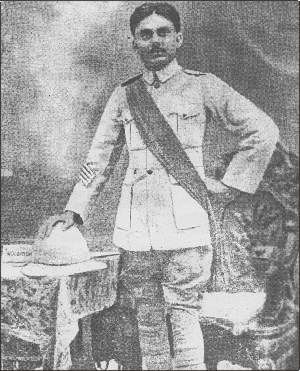Impact on Nazrul

In mid-1917, the World War was raging in Europe and in the Middle East. The war seemed far from Raniganj, where an eighteen-year-old school boy at Searsole Raj H.E. School was preparing for his send-up exams. In May that year, he had been awarded a scholarship which would continue till his Matriculation in 1918. The school authorities had, however, not reckoned with the excitement that the recruitment of Bengalis for the army would arouse in the young man. It was the first time since 1857 that Bengalis were being recruited for the army, perhaps to make up for the heavy losses suffered by the Allied troops – on July 1, 1916 alone the British army had suffered 60,000 casualties. So, instead of giving his exams, sometime in August or September 1917, Kazi Nazrul Islam joined the newly raised 49 Bengal. With a few hundred other Bengalis, he travelled all the way across India to join his regiment at Karachi. Two battalions of 49 Bengal were sent to the Mesopotamian front, but Nazrul remained at Karachi, being promoted to lance naik and then havildar. After the war ended in 1918, the regiment was demobilised and Nazrul returned to Calcutta in March or April 1920.
Though Nazrul spent only two and a half years in Karachi, they were crucial years. His stay in the army exposed him to war, but also to what was happening in Europe, Russia, and the Middle East. The army discipline, though irksome at times, paradoxically gave him the leisure to read and write. He subscribed to Bangla journals from Kolkata and also sent poems and stories these journals. The young man, who had written songs and dramatic pieces for a leto group based on myths and legends, now found inspiration in real-life events. The war gave him matter for several short stories – some real, some highly romanticised. His experience in the army also gave him matter for his first novel, Bandhon Hara, about a soldier-poet very like himself and even called “Nuru” – Nazrul’s nickname. Though in Bandhon Hara, Nuru goes to Mesopotamia to fight for the British, Nazrul would be writing much of his life against the British. Like many in India, he saw Kamal Ataturk as the symbol of a new country which had become independent. At the same time, momentous things were happening in Russia, which, at the beginning of the war, was on the side of the Allies, but would see a revolution before the end of the war. The socialist ideas of the revolution would inspire Nazrul to write his powerful poems of equality. The revolutionary poems of Nazrul are also indebted to the martial tunes that he heard as soldier. Nazrul, like the western poets of WWI, was a soldier-poet, but without the despair of Wilfred Owen or the frustration of the soldier depicted in Ernest Hemingway’s A Farewell to Arms. With “Bidrohi,” Kazi Nazrul Islam became the “rebel poet,” but it is quite possible that without his experience as a soldier-poet this poem might never have been written.
The writer retired as Professor from the Department of English, University of Dhaka and is at present Advisor, Department of English, Independent University, Bangladesh

 For all latest news, follow The Daily Star's Google News channel.
For all latest news, follow The Daily Star's Google News channel. 



Comments